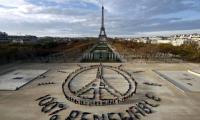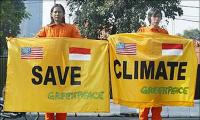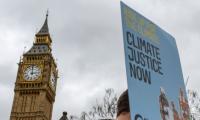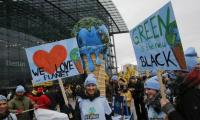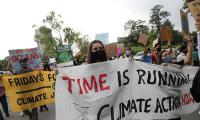COP Presidencies Call for Funding for Climate Plans
The presidencies of COP28, COP29, and COP30 urge countries to increase climate ambition and provide adequate funding for implementation in their next national climate plans.
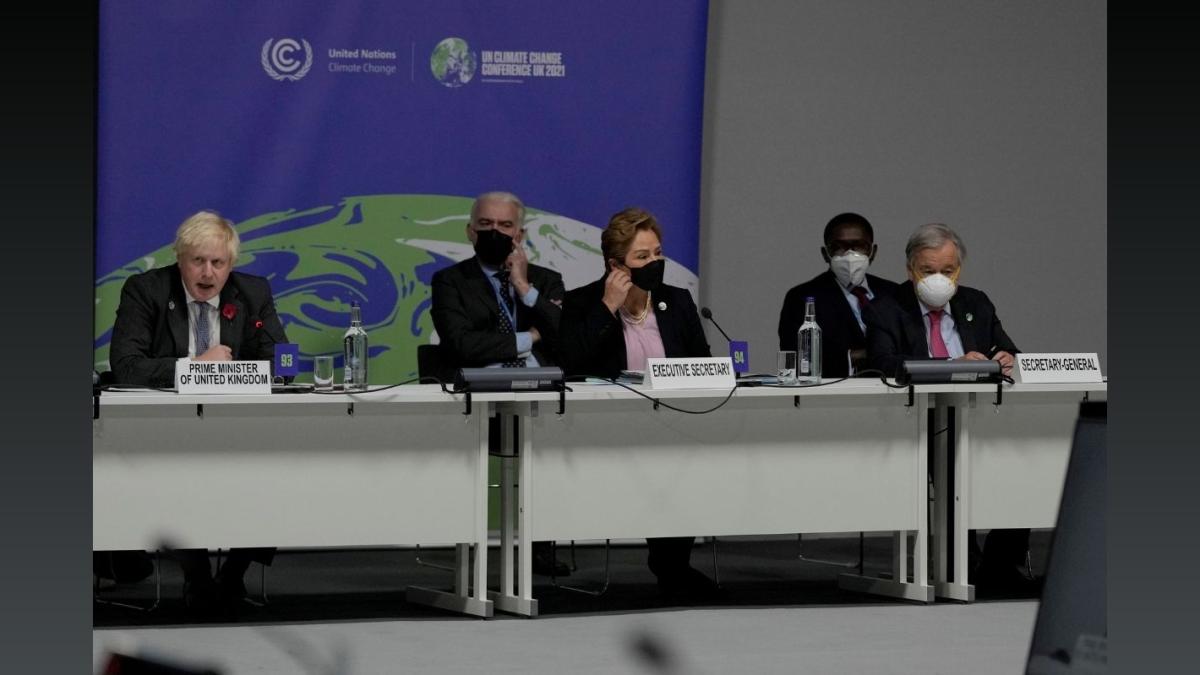
Photograph: Reuters
New Delhi, Jul 24 (PTI) The presidencies of the previous COP and the next two UN climate change conferences have said there are "clear challenges" in delivering climate ambition without the necessary means of implementation in place.
In a letter to countries that are signatories to the United Nations convention on climate change and its Paris Agreement, the United Arab Emirates (UAE), Azerbaijan and Brazil have said adequate means of implementation are needed to support the next round of national climate plans (nationally-determined contributions or NDCs) to limit global warming to 1.5 degrees Celsius.
They said climate action should reflect fairness and equity, recognising the special needs of vulnerable countries.
The hosts of COP28, COP29 and COP30 urged the countries in their letter to step forward with greater ambition in the next generation of NDCs due by February 2025.
These NDCs must be truly transformational, should mainstream climate action into broader development planning, catalyse investment for effective climate action and support the sustainable development goals, they said.
"It is acknowledged that 1.5 degrees Celsius-aligned NDCs will be essential to meet our collectively-agreed goals. Furthermore, SB60 also evidenced the clear challenges to deliver ambition without the necessary means of implementation in place," the letter read.
At the 2015 UN climate talks in Paris, world leaders committed to limiting the global average temperature rise to 1.5 degrees Celsius above the pre-industrial average to avoid the worst impacts of climate change.
The Earth's global surface temperature has already increased by around 1.2 degrees Celsius due to the rapidly-increasing concentration of greenhouse gases, primarily carbon dioxide and methane, in the atmosphere.
Poor and middle-income countries often argue that the current global warming and climate change impacts are disproportionately caused by the historical emissions of greenhouse gases by developed countries during their industrialisation phases.
According to the Intergovernmental Panel on Climate Change (IPCC), the world could experience a warming of nearly 3 degrees Celsius by the end of the century if current trends in GHG emissions continue without significant reduction efforts.
Developing nations argue that they cannot be expected to reduce GHG emissions faster if developed countries -- historically responsible for climate change -- do not provide enhanced financial support and technology.
The COP Troika said course correction to keep the 1.5 degrees Celsius goal within reach in a nationally-determined manner and build global resilience requires "transforming the world's current development model, encompassing different pathways and approaches".
This transformation must respond to the latest science and be guided by equity, ensuring that climate ambition can also drive social inclusion and economic prosperity and ensure a just and equitable transition for all in the context of sustainable development and efforts to eradicate poverty, they said.
In a letter to countries that are signatories to the United Nations convention on climate change and its Paris Agreement, the United Arab Emirates (UAE), Azerbaijan and Brazil have said adequate means of implementation are needed to support the next round of national climate plans (nationally-determined contributions or NDCs) to limit global warming to 1.5 degrees Celsius.
They said climate action should reflect fairness and equity, recognising the special needs of vulnerable countries.
The hosts of COP28, COP29 and COP30 urged the countries in their letter to step forward with greater ambition in the next generation of NDCs due by February 2025.
These NDCs must be truly transformational, should mainstream climate action into broader development planning, catalyse investment for effective climate action and support the sustainable development goals, they said.
"It is acknowledged that 1.5 degrees Celsius-aligned NDCs will be essential to meet our collectively-agreed goals. Furthermore, SB60 also evidenced the clear challenges to deliver ambition without the necessary means of implementation in place," the letter read.
At the 2015 UN climate talks in Paris, world leaders committed to limiting the global average temperature rise to 1.5 degrees Celsius above the pre-industrial average to avoid the worst impacts of climate change.
The Earth's global surface temperature has already increased by around 1.2 degrees Celsius due to the rapidly-increasing concentration of greenhouse gases, primarily carbon dioxide and methane, in the atmosphere.
Poor and middle-income countries often argue that the current global warming and climate change impacts are disproportionately caused by the historical emissions of greenhouse gases by developed countries during their industrialisation phases.
According to the Intergovernmental Panel on Climate Change (IPCC), the world could experience a warming of nearly 3 degrees Celsius by the end of the century if current trends in GHG emissions continue without significant reduction efforts.
Developing nations argue that they cannot be expected to reduce GHG emissions faster if developed countries -- historically responsible for climate change -- do not provide enhanced financial support and technology.
The COP Troika said course correction to keep the 1.5 degrees Celsius goal within reach in a nationally-determined manner and build global resilience requires "transforming the world's current development model, encompassing different pathways and approaches".
This transformation must respond to the latest science and be guided by equity, ensuring that climate ambition can also drive social inclusion and economic prosperity and ensure a just and equitable transition for all in the context of sustainable development and efforts to eradicate poverty, they said.
You May Like To Read
TODAY'S MOST TRADED COMPANIES
- Company Name
- Price
- Volume
- Vodafone-Idea
- 11.36 ( -2.49)
- 94664837
- AvanceTechnologies
- 1.16 (+ 4.50)
- 34522155
- Sunshine-Capital
- 0.26 ( -3.70)
- 29015901
- Alstone-Textiles
- 0.27 ( -3.57)
- 28695959
- Mehai-Technology
- 1.65 ( -4.62)
- 28262795
